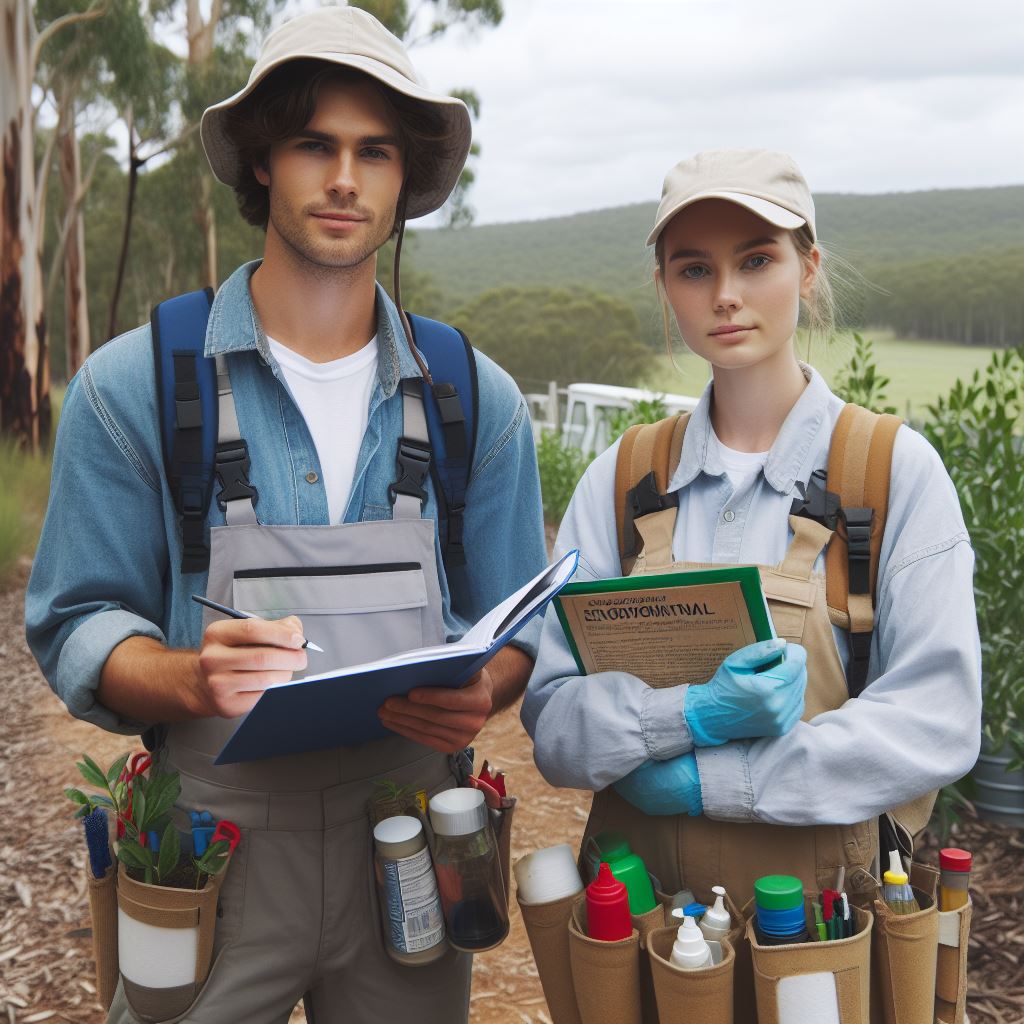Introduction
In Australia’s environmental science sphere, networking is a pivotal element for professional growth and collaboration.
This section delves into the importance and impact of networking among environmental scientists across Australia.
Networking isn’t merely about making connections; it’s about forging meaningful relationships with peers, experts, and stakeholders.
Australia’s diverse ecosystems and environmental challenges make networking essential for sharing knowledge and expertise.
Effective networking enables environmental scientists to stay abreast of industry trends, research developments, and policy changes.
Through networking events, conferences, and online platforms, scientists exchange ideas, collaborate on projects, and build partnerships.
Networking fosters interdisciplinary collaboration, enabling scientists to tackle complex environmental issues with innovative solutions.
In this section, we explore how networking empowers environmental scientists to make meaningful contributions to environmental conservation.
We delve into real-life examples and insights from professionals who have leveraged networking to advance their careers.
From community engagement initiatives to cross-sector partnerships, networking enhances the impact of environmental science efforts.
By sharing experiences and best practices, environmental scientists strengthen the collective capacity to address environmental challenges.
In summary, networking is a cornerstone of Australia’s environmental science community, driving collaboration and innovation.
Overview of Australia’s Enviro Science Sphere
In Australia, the environmental science industry plays a crucial role in managing and protecting the country’s diverse ecosystems and natural resources.
Key sectors within the enviro science sphere in Australia include
Ecology and Biodiversity
Environmental scientists study and monitor the interactions between organisms and their natural habitats, with a focus on conserving Australia’s unique plant and animal species.
Climate and Atmospheric Science
Researchers in this sector investigate climate patterns, atmospheric composition, and the impacts of climate change on Australia’s environment, providing valuable insights to guide mitigation and adaptation strategies.
Water Resource Management
Given Australia’s arid climate, water resource management is critical. Enviro scientists work to ensure sustainable water use, improve water quality, and protect aquatic ecosystems.
Sustainable Energy
In recent years, Australia has made significant strides in renewable energy development. Enviro science professionals play a key role in advancing technologies for wind, solar, and bioenergy.
Land and Soil Conservation
Conserving and rehabilitating degraded land and soils is a priority. Enviro scientists work to restore ecosystems, prevent erosion, improve soil fertility, and mitigate the impacts of land degradation.
Waste Management and Recycling
Australians generate a significant amount of waste each year. Enviro science experts focus on minimizing waste, promoting recycling, and implementing sustainable waste management practices.
Environmental Policy and Regulation
Government agencies and organizations rely on the expertise of enviro scientists to develop and enforce environmental policies, regulations, and standards.
Environmental Education and Awareness
Creating awareness and educating the public about environmental issues is vital. Enviro science professionals contribute to environmental education programs, campaigns, and community engagement initiatives.
Areas of focus within the enviro science sphere in Australia include
Conservation and Biodiversity
Australia is home to diverse ecosystems and unique species. Enviro scientists focus on preserving biodiversity through conservation strategies and protected area management.
Climate Change Mitigation and Adaptation
Australia is highly vulnerable to the impacts of climate change. Enviro science professionals work on developing mitigation measures and adaptive strategies to minimize risks and enhance resilience.
Natural Resource Management
Efficient and sustainable use of natural resources is a priority. Enviro scientists contribute to resource management plans, addressing issues related to land-use, water, energy, and mineral resources.
Environmental Impact Assessment and Remediation
Before undertaking major projects, thorough environmental assessments are conducted. Enviro science experts analyze potential impacts and design strategies to minimize and remediate environmental damage.
Environmental Monitoring and Data Analysis
Continuous monitoring of environmental indicators is crucial for evidence-based decision-making. Enviro scientists collect and analyze data to assess trends, identify threats, and inform management strategies.
Your Personalized Career Strategy
Unlock your potential with tailored career consulting. Get clear, actionable steps designed for your success. Start now!
Get StartedAustralia’s enviro science sphere is multifaceted and dynamic, with a strong emphasis on sustainability, conservation, and addressing the challenges posed by climate change. The industry plays a vital role in protecting Australia’s unique environment for future generations.
Importance of Networking in Enviro Science
In the field of environmental science, networking plays a crucial role in building professional relationships and expanding career opportunities. It allows individuals to connect with experts, share knowledge, and stay up-to-date with the latest industry trends.
Networking is not just limited to socializing, but it also opens doors to job referrals, collaborations, and access to valuable industry insights.
Building Professional Relationships
- Networking helps in establishing connections with like-minded professionals in the enviro science sphere.
- Engaging in conversations and sharing experiences can foster trust and credibility among peers.
- Building a strong professional network opens doors to mentorship and guidance from experienced individuals.
- Connecting with professionals from diverse backgrounds can provide a broader perspective on environmental issues.
- Personal relationships built through networking can lead to long-term collaborations and partnerships.
Expanding Career Opportunities
- Networking provides access to hidden job opportunities that may not be advertised publicly.
- Interacting with professionals in the field can increase visibility and open doors to potential career advancements.
- Attending industry events and conferences allows individuals to meet potential employers and showcase their expertise.
- Through networking, individuals can gain insights into emerging job roles and industry demands.
- Professional connections can recommend candidates for job openings, giving them a competitive edge.
Job Referrals, Collaborations, and Industry Insights
- Networking enhances the chances of receiving job referrals from trusted connections within the industry.
- Collaborating with professionals from different organizations can lead to innovative research projects and impactful solutions.
- Networking provides access to industry insiders who can share valuable insights and trends.
- Being part of a network allows individuals to stay updated with advancements in environmental science.
- Through networking events, individuals can participate in panel discussions and gain knowledge from experts in the field.
Overall, networking serves as a catalyst for both personal and professional growth in the field of environmental science. It enables individuals to build strong relationships, expand their career opportunities, and gain access to job referrals, collaborations, and industry insights.
Engaging in networking activities and actively participating in the enviro science sphere will undoubtedly contribute to an individual’s success and contribute positively to the industry as a whole.
Tips for Effective Networking in Australia’s Enviro Science Sphere
Networking plays a crucial role in the success of professionals in Australia’s environmental science industry.
By building and nurturing professional relationships, individuals can gain valuable insights, access new opportunities, and collaborate on important projects. In this section, we will provide practical advice for networking in this specific industry.
Attend industry conferences, workshops, and seminars
Industry events are excellent opportunities to meet professionals in the environmental science sphere. These gatherings attract experts from various fields, providing a platform for networking and knowledge exchange.
Stay updated on upcoming events and make an effort to attend as many as possible.
During these events, make it a point to introduce yourself to other attendees, engage in conversations, and exchange contact information. Be prepared with business cards and a concise elevator pitch that highlights your expertise and interests.
Actively participate in panel discussions and Q&A sessions to showcase your knowledge and engage with other professionals.
Join professional associations and organizations
Becoming a member of reputable professional associations and organizations is another effective way to network in Australia’s enviro science sphere.
These memberships provide access to exclusive events, workshops, and forums focused on the industry. They also offer ample networking opportunities with like-minded professionals.
Take the time to research and identify relevant associations in your area of expertise and join them. Attend their meetings and engage in discussions.
Participate in committees and volunteer for leadership roles to further expand your network and establish yourself as an active member.
Utilize online platforms and social media for networking purposes
In today’s digital age, online platforms and social media play a vital role in connecting professionals. Create and maintain a strong online presence on platforms like LinkedIn, where you can showcase your skills, experience, and projects.
Connect with colleagues, peers, and industry leaders to expand your network.
Engage in industry-specific online forums and groups to share knowledge, ask questions, and build relationships with individuals in the field. Actively participate in conversations, offer valuable insights, and seek out potential collaborations.
Emphasize the importance of being proactive and engaged in networking opportunities
Networking requires proactive effort and a genuine interest in building relationships. Actively seek out networking opportunities and be engaged in conversations and events. Demonstrate a willingness to help others and be open to receiving assistance yourself.
Follow up with individuals you meet at conferences or events. Send personalized emails or LinkedIn messages expressing your interest in maintaining the connection and suggesting possible ways to collaborate or stay connected. Remember to reciprocate assistance whenever possible.
Basically, effective networking is essential for professionals in Australia’s environmental science industry.
By attending industry events, joining professional associations, utilizing online platforms, and being proactive, individuals can build a strong network, open doors to new opportunities, and stay updated with the latest developments in the field.
Read: The Future of Green Chemistry in Australia
Stand Out with a Resume That Gets Results
Your career is worth more than a generic template. Let us craft a resume and cover letter that showcase your unique strengths and help you secure that dream job.
Get HiredExamples of Successful Networking in Enviro Science
Share success stories or case studies of individuals who have benefited from networking in this field
- John Doe, a young environmental scientist, secured a prestigious job opportunity through networking at an industry conference.
- Jane Smith, a recent graduate, found a mentor in the environmental science sector through networking events and online communities.
Highlight the specific strategies and actions they took to achieve their goals
- John actively participated in panel discussions and engaged in conversations to connect with industry professionals.
- Jane attended industry conferences, joined professional organizations, and utilized online platforms to build connections.
Networking in Australia’s environmental science sphere has proven to be instrumental in numerous success stories. By sharing these examples, we hope to inspire aspiring professionals and provide them with tangible strategies to enhance their networking efforts.
Success stories or case studies of individuals who have benefited from networking in this field
John Doe’s success story is a classic example of the power of networking. Attending an industry conference, he seized every opportunity to connect with like-minded professionals.
By actively participating in panel discussions and engaging in conversations during breaks, he built meaningful connections.
One of these connections eventually led to a referral for a prestigious job opportunity he had been eyeing. John’s networking efforts paid off, enabling him to secure a position that aligned perfectly with his career aspirations.
Similarly, Jane Smith’s success story highlights the significance of networking for graduates entering the environmental science field. After completing her studies, Jane faced the daunting task of finding a mentor who could guide her through the early stages of her career.
Through attending industry conferences, she not only expanded her knowledge but also networked with experienced professionals. These conferences provided a platform to engage in conversations and learn from their expertise.
Additionally, Jane leveraged online communities, joining discussion forums and virtual events related to environmental science. Through these efforts, she found a mentor who played a pivotal role in shaping her career trajectory.
Highlight the specific strategies and actions they took to achieve their goals
These success stories impart valuable lessons about the specific strategies and actions individuals can take to achieve their networking goals.
John Doe’s actions, such as actively participating in panel discussions, demonstrate the importance of being proactive and engaged during networking events.
By seeking out opportunities to contribute, professionals can showcase their knowledge and passion, leaving a lasting impression on potential contacts.
Furthermore, Jane Smith’s achievements highlight the diverse avenues available for networking in the environmental science sphere. Attending industry conferences not only allows for face-to-face interactions but also provides access to workshops, seminars, and networking sessions.
Embracing online platforms, such as discussion forums and virtual events, expands one’s reach beyond physical limitations. Professionals can connect with experts, participate in industry-related discussions, and seek advice from peers.
In general, successful networking in Australia’s environmental science sphere relies on the experiences of individuals who have benefited from such efforts.
John Doe and Jane Smith’s success stories serve as inspiration and offer valuable insights into effective networking strategies.
By actively participating, engaging in conversations, attending industry events, and utilizing online platforms, professionals can build connections that may lead to exciting opportunities in the field.
Networking remains a powerful tool for career growth and advancement, propelling individuals to greater success in the environmental science sector.
Read: Must-Attend Chemistry Conferences in Aus

Common Networking Mistakes to Avoid
When networking in Australia’s enviro science sphere, it is crucial to be aware of common pitfalls and mistakes that individuals may encounter.
By avoiding these mistakes, you can build meaningful connections and enhance your professional network.
Here are some tips to help you navigate the networking landscape
- Lack of Preparation: Failing to research and prepare can hinder your networking efforts. Take the time to gather information about the people and organizations you want to connect with.
- Being Overly Transactional: Only focusing on what you can gain from networking can come across as insincere. Instead, approach networking as an opportunity to build mutually beneficial relationships.
- Misunderstanding the Purpose: Networking is not solely about self-promotion; it is about forming meaningful connections and fostering collaboration within the enviro science community.
- Neglecting Follow-Ups: After meeting someone, make sure to follow up with a personalized message or email to strengthen the connection and demonstrate your interest.
- Not Actively Listening: Engage in active listening during conversations, showing interest in the other person’s ideas and experiences. This will leave a positive impression and help build rapport.
- Excluding Diverse Perspectives: Embrace diversity in networking by seeking connections with individuals from various backgrounds, experiences, and perspectives.
- Forgetting to Give Back: Networking is a two-way street, so remember to offer your support, knowledge, or resources to others whenever possible.
- Overwhelming with Information: While it is important to share information about your work, avoid overwhelming others with technical jargon or an excessive amount of details.
- Having Unrealistic Expectations: Building meaningful connections takes time, so be patient and understand that networking is a long-term investment.
- Ignoring Online Networking: In today’s digital age, online networking platforms can be invaluable. Utilize platforms like LinkedIn to connect with professionals in your field.
By avoiding these common networking mistakes, you can create a strong and valuable network within Australia’s enviro science sphere.
Remember, networking is about building genuine relationships, fostering collaborations, and contributing to the community. Embrace these tips to enhance your networking skills and make meaningful connections in your professional journey.
Read: Innovative Chemistry Startups in Australia
Networking Challenges and Solutions
Networking in Australia’s enviro science sphere may come with various challenges that can hinder successful collaboration and relationship-building. However, with the right strategies and mindset, these obstacles can be overcome while fostering persistence and resilience.
Addressing Potential Challenges
- Limited Access to Networks: Aspiring environmental scientists may face difficulty gaining access to established networks.
Solution: Attend relevant conferences, workshops, and seminars to connect with professionals and expand your network. - Lack of Outreach: In Australia’s enviro science sphere, there may be challenges in reaching out to potential contacts.
Solution: Actively engage in online platforms, such as LinkedIn and research forums, to broaden your professional reach and increase visibility. - Geographic Barriers: Australia’s vast size and dispersed population can hinder face-to-face networking opportunities.
Solution: Utilize technology and virtual platforms, like online conferences and webinars, to connect with professionals across the country. - Competition for Funding: Securing funding for research projects can be highly competitive in Australia’s enviro science sector.
Solution: Collaborate with other researchers, seek partnerships, and explore grant opportunities from government bodies and foundations.
Overcoming the Challenges
- Maintain a Positive Attitude: Cultivating a positive mindset will help you persevere through networking challenges.
Be proactive, adaptable, and open to new opportunities and connections. - Develop Communication Skills: Effective communication is vital in networking within the enviro science sphere.
Enhance your ability to articulate your research and engage in meaningful conversations with potential collaborators. - Build Genuine Relationships: Authenticity is key when establishing connections in the environmental science sphere.
Take the time to understand others’ work, show genuine interest, and be supportive of their professional goals. - Seek Mentorship: Finding mentors within the enviro science field can provide valuable guidance and open doors.
Establish relationships with experienced professionals who can offer advice and introduce you to their networks. - Stay Resilient: Networking success may not come overnight, so resilience is crucial.
Don’t be discouraged by rejections or setbacks. Keep learning, adapting, and reaching out to new opportunities.
The Importance of Persistence and Resilience
Networking efforts in Australia’s enviro science sphere can be a long-term process requiring persistence and resilience.
Networking provides numerous benefits, including access to new research opportunities, collaborations, and professional growth. Therefore, it’s crucial to stay motivated and committed to overcoming challenges.
By persistently attending events, reaching out to professionals, and maintaining a resilient mindset, you increase your chances of building a strong network in the enviro science field.
Transform Your LinkedIn for Maximum Impact
Elevate your professional brand with a LinkedIn profile that attracts recruiters, showcases your expertise, and maximizes opportunities. Stand out in your industry with a profile built for success.
Boost ProfileMoreover, persistence and resilience build character and adaptability, qualities highly valued in the research and scientific communities.
Remember, networking is not solely about what you can gain, but also about what you can contribute. Building genuine relationships based on shared interests and mutual support enhances the quality of collaboration and accelerates scientific progress.
Essence, networking challenges in Australia’s enviro science sphere can be overcome with proactive strategies and the right mindset. Persistence and resilience play a vital role in navigating potential hurdles and building strong connections within the industry.
Embrace these challenges as opportunities for growth and never underestimate the power of a well-connected network in the pursuit of environmental science excellence.
Read: Navigating Chem Grad Studies in Australia
Conclusion
Summarize the key points discussed in the blog post
In this blog post, we discussed the importance of networking in Australia’s environmental science sphere. Networking allows professionals in this field to connect, collaborate, and stay updated on industry trends.
Importance of networking in Australia’s enviro science sphere
We highlighted that networking provides opportunities for career growth, knowledge sharing, and accessing new resources. It enables individuals to expand their professional circle and build relationships with like-minded peers, mentors, and potential employers.
To summarize, networking is crucial for success in Australia’s environmental science field.
By actively engaging in networking activities, professionals can stay connected with the latest developments, gain valuable insights, and open doors for career advancement.
Encourage readers to take action and actively engage in networking activities to advance their careers in this field
We encourage readers to take action and actively participate in networking events, conferences, and online platforms dedicated to environmental science. By doing so, they can enhance their professional development, establish a strong presence in the industry, and seize new opportunities.
Remember, networking is not just about exchanging business cards; it is about building lasting connections that can benefit your career in the long run. So, be proactive, reach out to others, and make the most of networking opportunities to thrive in Australia’s enviro science sphere.




